离子特异性对 CH4 和 CO2 水合物热力学抑制作用的影响:实验与模型研究
IF 2.8
3区 工程技术
Q3 CHEMISTRY, PHYSICAL
引用次数: 0
摘要
碘盐和离子特异性对 CH4 和 CO2 水合物热力学抑制作用的影响尚未得到深入研究。在本研究中,我们采用等时压力搜索法测量了浓度为 6.24 wt% 和 12.48 wt% 的碘化物溶液中 CH4 和 CO2 水合物的解离温度(272.48 - 286.54 K)和压力(1.38 - 11.24 MPa)。测量数据随后被用于验证一个热力学模型,该模型将皮策模型集成到范德瓦耳斯-普拉蒂奥乌(vdW-P)模型中,用于预测气体水合物的解离压力。该模型可以准确预测 CH4 和 CO2 水合物在碘化物溶液中的解离条件。实验结果表明,碘盐对 CH4 和 CO2 水合物的抑制作用随盐浓度的增加而增强。此外,CH4 和 CO2 水合物的解离温度抑制与不同盐溶液的水活度相关,以研究离子特异性对这些水合物热力学抑制作用的影响。我们的分析表明,离子特异性存在于 CO2 水合物的热力学抑制中,但不适用于 CH4 水合物。此外,阴离子在二氧化碳水合物的热力学抑制作用中起主要作用。本文章由计算机程序翻译,如有差异,请以英文原文为准。
Effect of Ion Specificity on Thermodynamic Inhibition of CH4 and CO2 Hydrates: An Experimental and Modeling Study
The effects of iodide salts and ion specificity on the thermodynamic inhibition of CH4 and CO2 hydrates have not been thoroughly investigated. In this study, we employ the isochoric pressure-search method to measure the dissociation temperature (272.48 – 286.54 K) and pressure (1.38 – 11.24 MPa) of CH4 and CO2 hydrates in iodide solutions with concentrations of 6.24 wt% and 12.48 wt%. The measured data are subsequently used to validate a thermodynamic model integrating the Pitzer model into the van der Waals-Platteeuw (vdW-P) model for predicting the dissociation pressure of gas hydrates. The model can accurately predict the dissociation conditions of CH4 and CO2 hydrates in iodide solutions. The experimental results reveal that the inhibition effect of iodide salts on CH4 and CO2 hydrates is enhanced with an increasing salt concentration. Additionally, the dissociation temperature suppression of CH4 and CO2 hydrates is correlated with water activities of different salt solutions to investigate the effect of ion specificity on the thermodynamic inhibition of these hydrates. Our analysis demonstrates that ion specificity exists in the thermodynamic inhibition of CO2 hydrate but does not apply to CH4 hydrate. In addition, anions play a major role in the thermodynamic inhibition of CO2 hydrate.
求助全文
通过发布文献求助,成功后即可免费获取论文全文。
去求助
来源期刊

Fluid Phase Equilibria
工程技术-工程:化工
CiteScore
5.30
自引率
15.40%
发文量
223
审稿时长
53 days
期刊介绍:
Fluid Phase Equilibria publishes high-quality papers dealing with experimental, theoretical, and applied research related to equilibrium and transport properties of fluids, solids, and interfaces. Subjects of interest include physical/phase and chemical equilibria; equilibrium and nonequilibrium thermophysical properties; fundamental thermodynamic relations; and stability. The systems central to the journal include pure substances and mixtures of organic and inorganic materials, including polymers, biochemicals, and surfactants with sufficient characterization of composition and purity for the results to be reproduced. Alloys are of interest only when thermodynamic studies are included, purely material studies will not be considered. In all cases, authors are expected to provide physical or chemical interpretations of the results.
Experimental research can include measurements under all conditions of temperature, pressure, and composition, including critical and supercritical. Measurements are to be associated with systems and conditions of fundamental or applied interest, and may not be only a collection of routine data, such as physical property or solubility measurements at limited pressures and temperatures close to ambient, or surfactant studies focussed strictly on micellisation or micelle structure. Papers reporting common data must be accompanied by new physical insights and/or contemporary or new theory or techniques.
 求助内容:
求助内容: 应助结果提醒方式:
应助结果提醒方式:


